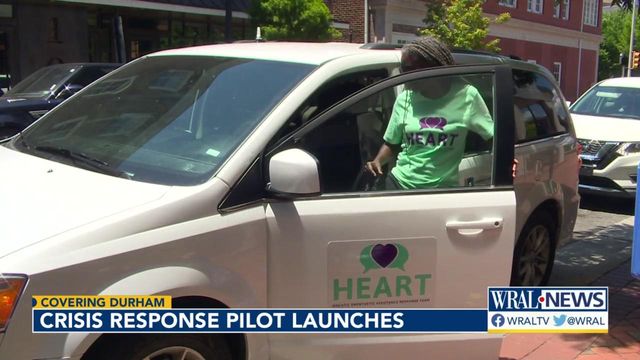In Durham, unarmed responders will answer 911 calls for those having a mental health crisis
Durham's new crisis response pilot program launches this week, sending responders specifically trained to answer 911 calls for those having a mental health crisis.
Posted — UpdatedThe program has three parts.
- The Crisis Call Diversion pilot starts on Tuesday. Mental health clinicians will become part of Durham's 911 call center. If a person or family member calls 911 for help with a mental health crisis, they can speak with a person who is specifically trained for these situations.
- The Community Response Team will hit the streets on Wednesday.
- Care Navigators, who connect people with help they need after the initial contact, start their work on Thursday.
How does Durham's Crisis Response Program work?
New crisis counselors in Durham's 911 call center are ready to assess callers' needs and connect people to resources.
They are also trained to de-escalate situations over the phone, before the arrival of first responders, and to dispatch community response teams and support first responders in the field.
Durham's three-person Community Response Teams will be dispatched to those calls identified as needing a mental health support response. The teams will be in uniforms and vehicles specifically designed to look different from police.
"Sometimes, people can be scared of law enforcement," says Frank Martinez, who lives in Durham. "But if they have somebody come in that is not armed and is able to help out psychologically, that's the best idea."
All of these teams operate under the name "HEART," which stands for "Holistic Empathetic Assistance Response Teams."
Durham residents hopeful about program's success
Durham residents say they are hopeful this will help the city tackle a growing problem – and that they're ready for a new way of thinking about community safety.
WRAL News asked Durham residents how they felt about the program.
"Anything that has been researched and discussed in a healthy manner that can help to decrease some of the pains and ills we've seen in our city, I think is worth trying," said Chuck Reed, who lives and works in Durham.
KJ Hill, who also lives and works in the city, said, "We need capable people to be able to deal with the mental health issues and crises that exist, and so this is definitely a step in the right direction."
They both say the current system isn't working.
With a police shortage in Durham, Jeffrey Hall said he's glad the program frees up police to respond to other urgent calls.
Colandra McDowell is eager to see the program focus on empathy.
"To see someone come up who's taking into consideration that you're dealing with someone who has mental health issues, I think it's comforting to the family," she said.
Harah Agarwal, a student at the University of North Carolina at Chapel Hill, says he hopes the program will be permanent.
"I hope it remains sustained, people take it up, it works, and there is continuous funding for it," says Agarwal.
Related Topics
• Credits
Copyright 2024 by Capitol Broadcasting Company. All rights reserved. This material may not be published, broadcast, rewritten or redistributed.






